Peter MALONE
Saturday, 18 September 2021 19:55
This was Paris
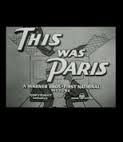
THIS WAS PARIS
UK, 1942, 77 minutes, Black and white.
Ann Dvorak, Ben Lyon, Griffith Jones, Robert Morley, Miles Malleson, Bernard Miles, Hay Petrie.
Directed by John Harlow.
This was Paris was made in London, Teddington Studios, by Warner Brothers as part of the war effort. It focuses on Paris in 1940, initially indicating that most of the citizens (many British their and the French and German sounding a touch British) were ignoring the possibilities of an invasion from Germany and that the pact could be made between the two countries. They had underestimated the presence of a fifth column which was preparing for the German presence.
The credits are interesting because of the contemporary cartoons underlying them, making fun of Hitler.
The star, Ann Dvorak, was married to British director, Leslie Fenton, and spent time in England making films and serving in the war effort as an ambulance driver – which she does in the film. American Ben Lyon portrays a newspaperman pursuing fifth columnist, agents, especially an alleged Dutch businessman, played by Robert Morley with an accent. Griffith Jones is a British intelligence officer who falls for the leading lady. Glimpses can be seen of British character actors including Miles Malleson and Bernard Miles. American singer, Elizabeth Welch, has a lavish cabaret number with orchestra and backup, reminiscent of Josephine Baker. Elizabeth Welch was to sing Stormy Weather in Derek Jarman’s The Tempest.
The brief running time is used up initially by peaceful Paris scenes and fashions but, if audiences give the film 10 minutes, it becomes a touch more interesting with the fifth column investigations. Direction is by John Harlow, British director from the 40s into the 50s of small budget films.
1. The style of war propaganda films made in the early 1940s? By American companies? In England with a principally English cast?
2. The atmosphere of Paris, 1940, detached, carefree, acknowledgement of the war but a large number of people ignoring the war? Romance, cabaret, fashions?
3. Bill Hamilton, enlisted, driving the alleged socialite, discovering that she was working for Intelligence? Ann bumping into him, fixing the car, his encounter with Butch, the drinking, the talk, take him home? Meeting Blossom, discovering Ann, going out, the quick romance, talk, dancing, cabaret? His being invited to work for Intelligence? Suspicions about Ann and the company she worked for? Talking with her, her being upset, walking away, no explanation? The sketches of guns in her file? The reassurance from the concierge about the Dutchman’s innocence? His meeting Ann again, going to work for the ambulance, his questioning her again, in the back of the van, the bombardment, hiding in the woods, the discovery of the secret compartment, the document, their attacking the man searching? Being taken by the police, the interrogation, the information about the bridges and invasion? The vehicle being commandeered, finding the circus man, walk back to Paris, refugees fleeing, going to the fashion store and seeing the German woman? Going on?
4. Ann, American, fashion designer, the firm, bumping into Bill, going out with him, quick romance, interrogation? On-again, off-again encounters? The head of the store, his persuading her to drive the ambulance? With Bill, the attack, the document, the carnival owner, the carousel, going back to Paris?
5. Butch, the American journalist, articles censored, his editor being upset, the money for the drink, meeting Bill, encountering the Dutch businessman, suspicions, interrogation that the train, the reassurance of the Dutchman as innocent? The doorman, his being a German agent, Bill attacking him?
6. The head of the firm, working with the Germans, hoping for peace pact, the ambulances, the Germans giving him money, the head of the company in Paris, her taunting him, his realising what he had done?
7. The phone calls to the Dutch businessman, the fact that he was German, cover, supplying money for the fifth column, preparing the presence of the Nazis, the interrogation and the train? The woman at the fashion shop? German infiltration?
8. The film as propaganda at the time? The wartime curiosity now?
Published in Movie Reviews
Published in
Movie Reviews
Tagged under
Saturday, 18 September 2021 19:55
Victoria
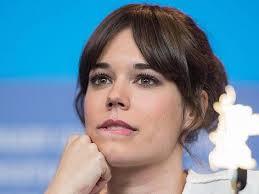
VICTORIA
Germany, or 2015, 1040 minutes, Colour.
Laia Costa, Fredrick Lau.
Directed by Sebastian Schipper.
Victoria is the name of a young Spanish woman spending time in Berlin. While she has work, we see her dancing the night away, and linking up with some men at the club. She agrees to study with them but they have a different agenda, one of them, just out of prison, is in debt to one of the prison bosses and has agreed to commit robbery. He persuades his friends to join him, but one is very drunk and they persuade Victoria to be the chauffeur. She moves willingly into the plan, becoming more and more exhilarated, even when she is fearful. The young man that she is attached to tries to be protective of her but his friend in need prevails.
The main feature of the film, which won an award at the 2015 Berlin Festival, is the Cinematography, the design of the screenplay to take place in real time, meaning that the director of photography has to ensure that the film looks as it if it has been one single take. This does give some rise to artificiality in photography and design, placement of the camera, and this also means that there are some deficiencies in the plot (for example, the group leaving their car with the drunk man in the boot, available to the police, and going out to a club only a few minutes walk away).
There is an intensity about the film, in the difficult relationships, the effect on each of those involved, the impact on Victoria herself, her relationship with the young man, their eventually having to escape, going to a hotel, his being wounded, his urging her to go away with the stolen money – and the final answer to her dilemma.
1. A slice of German life, Berlin and action?
2. The director’s intention, working in real time, the devices for the impression of continued shooting?
3. Berlin at night, the clubs, the streets? At dawn, the warehouse, the rehearsal for the robbery? The robbery (and actually its not being seen)? Berlin in the day, the escape, clubbing, the police pursuit, the apartment and the baby, the parents? The hotel, the room, calling the ambulance?
4. The musical score, the range of songs, especially at the club?
5. The focus on Victoria, Spanish, her English, being six months in Berlin? Her job, absorbed in her dancing, meetings Sonne, his friends and the situation, her enjoying their company, going on for another drink, 4 o’clock in the morning, the mission, Boxer and his concern, her agreeing to drive? The mastermind for the crime, always referring to as her as a bitch? Driving, the engine going flat, panic, the men in the car, ditching the car, going to the club, absorbed in the dancing? Remembering Fuss, in the boot, drunk? Seeing the police with the car, the shootings, running, Sonne and Victoria going to the apartment, changing clothes, taking the baby, getting out beyond the police, bluffing their way, leaving the baby in the shop, hailing the taxi, cheerful with the driver, the hotel, Victoria getting the room, Sonne and his wound, on the bed, her calling the ambulance, his death? The issue about the money, his wishing her to take it? Victoria walking out of the hotel, with the money? A portrait of a young woman?
6. Sonne, the club, the style, the strobe lights, his hitting on Victoria, friendly, his other friends, Boxer and his being in prison, desperate, persuading Sonne about the job, Blinker, Fuss and his being drunk? Sonne and his continually shielding Victoria? The rehearsal? The actual job, getting back in the car, going clubbing, the chase, Sonne being shot, the apartment, the taxi, the hotel, his dying?
7. Boxer and his intensity, in jail, his protector, returning the favour, need for people, Fuss drunk, his anxieties, persuading Victoria? The boss, the plan, the aftermath? His being shot? Blinker and his being shot by the police? His drinking, the mastermind making them to take drugs to heighten their energy?
8. The scene in the apartment, the terrified couple, the baby, pleading, the changing clothes? The baby in the shop?
9. The taxi, the hotel, Victoria and her ingenuity, Sonne and his dying? Her leaving?
10. A slice of criminal life?
Published in Movie Reviews
Published in
Movie Reviews
Tagged under
Saturday, 18 September 2021 19:55
Sponge Bob Square Pants Movie, The: Sponge out of Water
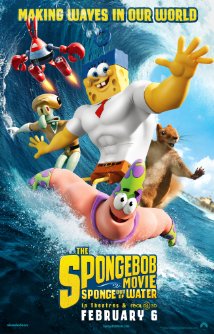
THE SPONGEBOB SQUAREPANTS MOVIE, SPONGE OUT OF WATER
US, 2015, 92 minutes, Colour.
Antonio Banderas, Voices of: Paul Tibbitt, Tom Kenny, Bill Fagerbakke, Rodger Bumpass.
Directed by Paul Tbbitt.
The ideal reviewer for this film would be a six year old, girl or boy. The Australian Catholic Film Office does not have this kind of ideal reviewer on its staff, so what is an older reviewer to do! Describe the experience of watching the film with 30 of the ideal reviewers, some parents and teachers.
Actually, it is quite an experience to sit with this kind of audience to watch a film which is squarely, squarepantily, aimed at them and not their parents. Although one needs to add that the Pirate King, Burger Beard, had a face behind his thick beard and a voice that sounded familiar enough. After a minute or two, it was Antonio Banderas, so something for the parents to look forward to see how he handled working the cartoon characters, how he behaved like a villain, how he got his comeuppance and realised that it was not wise to tangle with Sponge Bob and his friends.
The main thing to say about the audience was that they gave no impression of being a captive audience. Rather, they seemed enthralled the whole time, only one little boy going out with his father to the toilet. It was rather surprising that they tended to be quiet rather than rowdy as well as quiet during most of the film, laughing out loud at some of the moments (of the slightly breakwind and trousers down variety) and the number of the pratfalls with people falling over or being hit, that kind of thing. (The reviewer realised that these moments with little kid giggles proliferate in so many American comedies these days, allegedly for adults, getting lots of little kid giggles with the very same incidents.)
Probably most of the young audience come prepared, watching Sponge Bob on television, comparatively long time fans. So, they knew Sponge Bob and his situation beneath the sea, the restaurant selling crab patties and Mr Krabs and its hard times, the star-shaped Patrick, Squidward, Kyle, the issue of a secret formula for making the crab patties and a nasty Plankton, Sponge Bobs old foe (although he does make good, more or less) trying to discover and steal the formula.
Whether the audience guessed it, but the parents and teachers and reviewers probably did, it’s the pirate king who has stolen the formula and is making good on it, quite profitably. This means a lot of pursuit by Sponge Bob and his friends, entering into the spirit of the thing, experiencing some strange shapes and sizes with the appearances of their characters, but with great heroics (of the suitable for six-year-old style), and they win the day.
The animation is bright and colourful, the characters clearly shaped and amusing, especially SpongeBob? himself. IMDb research reveals that not only has there been the television series but there have been several previous Sponge Bob films, some straight to video: The Sponge Bob Square Pants Movie (with such voices as Alec Baldwini, Scarlett Johansson, Jeffrey Tambour and David Hasselhoff), 2004; Sponge Bob Square Pants Spongicus, 2009. And there was a television special, Sponge Bob Square Pants, Lights, Camera, Pants, 2005, introducing audiences to the animators and how they created the series. Not sure whether this is the kind of information that the six-year-old reviewer would have written, but each of them obviously experienced it with relish.
So, reviewed by an adult, resisting any temptation to write like the ideal young reviewer!
Published in Movie Reviews
Published in
Movie Reviews
Tagged under
Saturday, 18 September 2021 19:55
DUFF, The
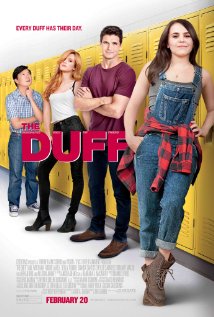
THE DUFF
US, 2015, 100 minutes, Colour.
Mae Whitman, Robbie Amell, Bella Thorne, Bianca A. Santos, Skyler Samuels, Romany Malco, Nick Eversman, Chris Wylde, Ken Jeong, Alison Janney.
Directed by Ari Sandel.
Would anybody be drawn in to see a film which was called The DUFF? Seems rather unlikely! And even when it is explained that DUFF stands for “Designated Ugly Fat Friend”? Possibly not. But, the producers did make the film and here it is.
Mae Whitman is very good as Bianca, the DUFF. She doesn’t realise it at first but as she explains to the audience when we initially see her first with her friends, the attractive Jess and Casey, she points out that everybody greets them and seems to miss out on her, or not notice her, or notice her and ignore her. This is especially the case with Madison (Bella Thorne) who fancies herself as the most attractive girl in the school, claims, when it suits her, Wes (Robbie Amell), the football captain and school jock, as her on-again, off-again boyfriend. Madison informs everybody that life, even at school, is a preparation for her life as a celebrity on Reality Television.
Despite the looks, she is pretty clueless about life and relationships. Which may remind us that this was the 90s equivalent of The DUFF, Clueless, Alicia Silverstone and friends at high school, making a mess of life at times but trying to put it in order. And then, almost a decade later, came Mean Girls, with Rachel Mc Adams as one of the meanest persecuting poor Lindsay Lohan until she joined them. Perhaps every decade has to have its high school mean girls movie.
Bianca is shorter than her friends, with the touch of the tubby which makes her self-conscious about the Fat in DUFF. But Wes assures her as he drops the title on her that it actually means the character in any situation who is overlooked but is approached to get access to the high-flying characters. Bianca has her own life to live, is very good at school work, has to cope with her mother (Alison Janney in yet another cleverly humorous role) who, after being left by her husband, has discovered the five stages (without open acknowledgement of Elizabeth Kubler-Ross) of grieving and incorporates them into seven’s seminars dealing with stress, satirised a little, but having their place.
She also works on the school magazine, edited by Ken Jeong, an amusing performance, much, much lower key than how we found him in such films as The Hangover series. He commissions Bianca to write an article on her personal, deeply felt responses to the Homecoming Dance.
Surprisingly influenced by peer pressure, Bianca alienates her two close friends, who really are friends. She also tangles with Wes who, in fact from the childhood, has been the boy next door. While he is a jock, he is a sympathetic character, finds Madison particularly waring, is much more content chatting with Bianca.
Bianca has a crush on musician, Toby, but is awkward in talking with him. She and Wes make a deal, she helping with his studies so that he can resume his football captaincy and get sufficient grades for graduation. He offers to help her to be more sociable, with a long sequence where they go to a store and she tries on numerous dresses – only to find much later that Madison’s toadying friend is taking video of Bianca, the clothes and talking about the boyfriend. The girl does the same when Bianca takes Wes to her favourite place, and more video. As might be expected, the video makes its blatant appearance during the Homecoming Dance. Which leads into the later development of principles against cyberbullying.
In case anyone is upset because our heroine, Bianca, alienates herself from her two good friends, she does come to her senses, thank goodness. She doesn’t want to get to the dance, but her mother urges her, and there is the almost-but-not-quite ending that we expected!
Older reviewers and older audiences will find that this period of their lives is long, long gone!
1. The popularity of high school films? Of Mean Girls movies? Mean Girls of 2015?
2. Audience expectations, the popular students and school, the ordinary students, clashes, girls and boys? The prom queens and the jocks?
3. The town, homes and families, next door, school, classes, classrooms, the corridors, the Principal and the teachers? The Homecoming Dance? Students and parties? The musical score?
4. The title, Designated Ugly Fat Friend, as explained by Wes? The broader application, the variety of DUFFs and their function? Comparisons? The means of access to popular students? As illustrated throughout the film?
5. The introduction, Bianca and her friends, the closeness, the touches of glamour, people’s reaction, ignoring Bianca? In class, science experiments? The relationship with Wes, the jock, football and being banned unless grades improve, the boy next door? The contrast with her crush on Toby?
6. Madison, the Prom Queen, glamour, vacuous, the preparing for life on Reality Television, the relationship with Wes and using him?
7. Toby, his playing, Bianca’s crush, the awkward meeting?
8. Bianca, the reaction to her two friends, breaking off with them, cancelling all the social media? The puzzle about her behaviour?
9. Wes, football, awkward, imposed on by Madison, preferring to talk with Bianca, memories of their growing up, living next door?
10. The deal between Bianca and Wes, help, giving him the maths book, the lessons? His transforming her, going to the shop, trying on all the clothes, the collage of the clothes? Their meeting, talk, the preparation for the date with Toby, the black dress gift, imagining the situation, the nature talk, leaning in…? The actual date, his claims of making the sushi, discovering the truth, feeling used, anger, and at Wes?
11. Bianca and her relationship with her mother, her mother being abandoned, her grief, discovering the Five Steps, using this as a basis for seminars, her clients? Supporting Bianca, criticising? The online dating, the reactions? Supporting Bianca with Wes and going to the dance?
12. The magazine, the editor and his humour, the gay teacher and his help, attracted to Wes? The style of the magazine? Bianca commissioned to write the article, the editor urging her on?
13. Bianca not wanting to write the article, going to the party, the friend of Madison doing the videos in the shop, and at Bianca’s special place, the rock, with Wes?
14. Anger, the reconciliation with Wes? Going to the homecoming, friends again with the girls? The announcing of the Queen, Madison on stage? The announcing of Wes as King, his decision to stay with Bianca and their leaving the dance?
15. Theme of bullying, cyberbullying, the filming of Bianca and Wes, their immediately being sent out to all the students, people’s reaction? The reaction of the principal? The cyberbullying making the film more topical?
Published in Movie Reviews
Published in
Movie Reviews
Tagged under
Saturday, 18 September 2021 19:55
Delusion
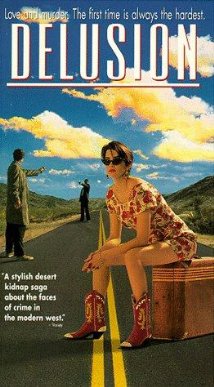
DELUSION
US, 1991, 100 minutes, Colour.
Jim Metzler, Jennifer Rubin, Kyle Secor, Jerry Orbach, Robert Costanzo, Tracy Walter.
Directed by Carl Colpaert.
Delusion was very well received in the 1990s but by an audience which admired small thrillers and variations on film noir. It has gained something of a cult status.
This is a road movie, familiar enough in some of the plot outlines, the central character, George, Jim Metzler, is in something of a similar situation to Janet Leigh at the beginning of Psycho, driving out of town with embezzled money.
He picks up a couple on the way through the desert, Kyle Secor an Jennifer Rubin, who, of course, are not what they seem. Secor portrays a hired killer. Jerry Orbach also portrays a killer.
There are several twists and turns, revelations of character, power struggles, which keep the audience attentive.
The co-writer-director, Carl Copaert, was originally from Belgium but has worked in the United States, and who firmly in his career worked with Roger Corman.
.
1. A road thriller? 1990s film? Achieving something of a cult status?
2. The colour photography, of California, the desert, Nevada, Reno? The musical score?
3. The twists in the plot, the title, and whose delusions?
4. The use of the thriller conventions, the car and the road, hitchhikers, twists of plot, revelations of characters, hitmen and murders, big business, Nevada?
5. George, his social status, his work, let go? Embezzling the money, in the car? His friend, the law, his motivation?
6. Travelling the desert, picking up the couple? The initial impression? Chevy and his being sickly? Patti? The audience learning that Chevy was a hired killer, to eliminate George? Patti was a showgirl, part-prostitute? His interactions with them, listening to them talk, feeling superior? Their turning the tables? A different kind of George?
7. The repartee, uneasy, witticisms? Stopping? Larry as a hired killer? Dealing with him?
8. The border, the gun, the takeover, the tension?
9. Larry, jovial, the barbecue, the diversion?
10. The money, Patti having it? George, death, Sales, the escape and the diversion?
11. The confrontation, the fall, being found? George, Sales?
12. Tthe twists in the plot, the different revelation of characters?
Published in Movie Reviews
Published in
Movie Reviews
Tagged under
Saturday, 18 September 2021 19:55
Class Act
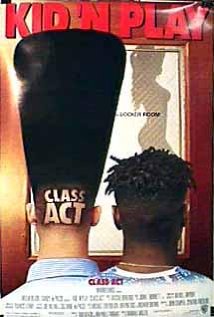
CLASS ACT
US, 1992, 98 minutes, Colour.
Christopher 'Kid' Reid, Christopher 'Play' Martin, Meshach Taylor, Mariann Aalda, Loretta Devine, Ric Ducommun, Rhea Perlman.
Directed by Randall Miller.
There are several meanings in the title of this film, class in the sense of school, class and a sense of class distinctions. There are several meanings also for act, something done and achieved, performance, acting.
The film comes from the early 1990s at a time when there was an increase in American movies portraying African- American stories, many gangster films of the period as well as comedies like Sister Act.
The stars of this film have played together in a number of comedies including the House Party series and have continued performing for over 20 years.
The premise of the film is rather simple. On the one hand we see a youngster growing up in tough neighbourhoods, his mother trying to cope with him, his doing all the wrong things, mixing with all the wrong people, growing up into teenage and finally landing in jail. This is Blade, played by Christopher Martin. On the other hand, there is a very wealthy family, one child, the parents inordinately proud of their son, Duncan, who in fact has a very high IQ. He also has a most peculiar vertical hair-do, seen in the House Party films, as played by Christopher Reid. He is clever as a child, clever as a teenager, very well spoken, prim and proper, lacking in worldly ways. He is to do his final year at a local school and get a scholarship for further studies. The school welcomes such a brilliant student.
Over the decades there have been many identity mix-up films. The mix-up here is rather contrived when the principal of the school finds that the documents for each of the students have been reversed as they were knocked out of someone’s hand and scattered on the floor. He is very welcoming to Blade and places him puts into advanced classes (and one of the teachers is Rhea Perlman).The principal is very dismissive of Duncan and put him with the detainees who pay no attention to a poor teacher trying to teach them about transitive and intransitive verbs.
As might be expected, the real Blade, has to try to manage in advanced classes, helped by the teachers who interpret his slang and ideas as brilliance, attracted to one of the female students. On the other hand, the real Duncan has to make his mark and to get a good PE score. At football, when he calculates wind force and other factors, he is an expert goalkicker. One of the girls is attracted to him as well.
The real Blade has to teach Duncan survival techniques as well as social techniques – and rearranging his hair. He begins to respond with the exuberance. The real Duncan has to help Blade with his studies. They form a friendship, actually work well in keeping up the pretence, Blade actually bringing a flower to his mother to her astonishment, Duncan’s parents continually amazed at what is happening but not intervening, and finally happy when they find their son in bed with his girlfriend. It is that kind of film.
This was also the period of films like The Revenge of the Nerds and is a variation on the theme. It was directed by Randall Miller who directed a number of television films in the 1990s and the next decade but moved into feature films with Nobel Son, CBGB.
Published in Movie Reviews
Published in
Movie Reviews
Tagged under
Saturday, 18 September 2021 19:55
Paris Blues
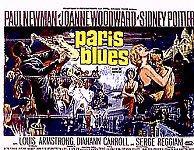
PARIS BLUES
US, 1961, 98 minutes, Black-and-white.
Paul Newman, Joanne Woodward, Sidney Poitier, Diahann Carroll, Louis Armstrong, Barbara Laage, Serge Reggiani.
Directed by Martin Ritt.
Martin Rittt was a director of solid dramas during the 1950s and 1960s. He had some experience of the black list and was later to make the film about those times, with Woody Allen, The Front.
He made a number of films with Paul Newman including Hemingway’s Adventures of a Young Man, Hud, Hombre. He had worked with Sidney Poitier earlier in Edge of the City/A Man is Ten Feet Tall.
Microphone off or The film was somewhat risky in its time, especially the discussions about Civil Rights prior to 1963 and Martin Luther King. Sidney Poitier had played in The Defiant Ones, handcuffed to Tony Curtis, something of a breakthrough film in 1958. Here he is paired with Paul Newman, already a significant star. He was to continue to be for another 40 years, winning his Oscar in 1976 for The Colour of Money. This was one of his many films with his wife, Joanne Woodward.
The two men portray musicians in Paris, on the Left Bank, not the travelogue area of Paris but in the tradition of literature and music. They encounter two tourists from the United States, Joanne Woodward and Diahann Carroll, another black and white pairing. While there is some romance, there is not an easy resolution with Paul Newman wanting to stay in Paris and compose while Joanne Woodward wants him to return home. The black couple discuss civil rights but Sidney Poitier wants to stay in Paris where he has peace and respect.
The musical score was nominated for an Oscar, written by Duke Wellington. And Louis Armstrong is an added jazz bonus.
1. A film of the early 1960s?
2. The Paris settings, the Left Bank, black-and-white photography? Authentic feel of literary and music?
3. The cast, status at this time? The friendship between the black and white characters? Civil rights discussion in the early 1960s?
4. Expatriates, the men living in Paris, musicians, their ambitions, composing, playing? For the black man to live in Paris without racial disputes?
5. The importance of jazz, the planning, performance, Louis Armstrong? Duke Ellington and his Oscar-nominated score?
6. Paul Newman as Ram, personality, character, performance, goals? Eddie, away from the United States, away from racism, living with some respect? The friendship between the two men?
7. Lillian and Connie, travelling to France, to Paris, the holidays? Lillian, strong character, white? Connie, strong character, blank? The friendship in films of this time?
8. The interaction between the men and women, dating, talking, the music, the jazz, the different moods?
9. Ram, performing in the bar, Marie as proprietor, fostering the jazz? The affair with Ram?
10. The character of the gypsy, music, narcotics?
11. The development of the relationships? The travelogue touches? Enjoying time in Paris?
12. Crisis, decisions? Ram wanting to stay in Paris, Lillian wanting him to return? His reasons, the discussion scene between them, his hardening his
attitude? Connie, talking civil rights with Eddie, wanting him to return, his wanting to stay?
13. Realistic drama? Issues of the period? Jazz?
Published in Movie Reviews
Published in
Movie Reviews
Tagged under
Saturday, 18 September 2021 19:55
Shaun the Sheep Movie
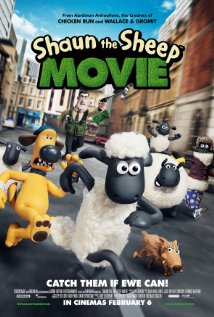
SHAUN THE SHEEP MOVIE
UK, 2015, 85 minutes, Colour.
Voices of: Justin Fletcher, John Sparkes, Omid Djalilli.
Directed by Mark Burton, Richard Starzac.
This is a holiday film which will entertain young audiences and keep their parents interested and amused, even though the story is very slight and a straightforward adventure of sheep and a dog in the city looking for their farmer who has a concussion, loss of memory, and is in hospital.
The films, both feature-length and short, from Aardman Studios in Bristol, have a very high reputation. A quarter of a century ago they made the short film, A Grand Day Out, following with a number of very entertaining films featuring Wallace and Gromit. Since they have been screened on television many times, most audiences may have seen the films – but repeats will entertain the youngsters who have not seen them. Their feature films include Chicken Run and Curse of the Were- Rabbit.
Shaun the Sheep is not new to television or film. He made his debut in the third Wallace and Gromit film, A Close Shave. Then he had his own television series, a range of short films, which endeared him to audiences. Now he has his own movie!
While there is a lot of music in the background and quite a number of noises, grunts and exclamations from the characters, the film works in the vein of silent films, no spoken dialogue, character and impact relying on visuals, expressions, situations, and quite a bit of slapstick comedy.
Shaun and the small number of sheep on the farm, live their day, day by day, according to the farmer’s routine, waking up, breakfast, slamming the door and squashing his dog, getting his list of chores, rounding up the sheep – and one day shearing them including Shaun. But routine is routine, even for the sheep on the farm, and Shaun must have remembered that Aardman Studios started with A Grand Day Out. Why not a day for Shaun and the sheep!
It seems a good plan, with the farmer in his truck, but Shaun and the sheep underestimating a hill, downhill, so that the truck goes hurtling down, the farmer gets hit on the head and has to go to hospital where he loses his memory. This means that the Grand Day Out is one of rectifying the situation, tracking down the farmer, discovering him in hospital, passing a group singing in Baa- Baa’s shop, and trying to avoid the machinations the Bif Ciyt’s animal hunter. One of the enjoyable jokes, repeated, is having the sheep go round and round jumping over a barrier with the farmer and the hunter watching and gradually nodding off and falling asleep, not exactly counting the sheep, but the equivalent.
This means a lot of humorous situations, parodies of human behaviour, pratfalls and mistakes, the sheep getting themselves in tangles, and the dog doing his best to help out. Happy to say that when they get the farmer back home, and go into their routines, he gradually gets a sense of their presence, recovers and all is the same, no, better, at the farm with the dog almost always avoiding being crushed by the door.
Perhaps not the most memorable of Aardman Studios films, but certainly a welcome and popular addition.
1. The popularity and quality of the Aardman Studios films? The popularity over the decades? The stories, characters, comedy and adventure?
2. The popularity of Shaun the Sheep, in the shorts television films, his own series, star of a feature film?
3. The stop-motion animation, meticulous in attention to detail? The farm backgrounds, the Big City, the blend of the familiar and the surprising? The detail of the characters, the sheep, the dog, the humans? The musical score?
4. Silent film techniques, no words, just sounds, reliance on the visuals and expressions?
5. The routine at the farm, the farmer getting up, breakfast, the dog squashed by the door, the list, the leaves of the calendar, rounding up the sheep? The shearing of the sheep?
6. Shaun, the youngest, the leader, his strong personality? The idea of the day out? The plan, the role of the sheep, the dog? The farmer, asleep in his truck, the crash, concussion, hospital, amnesia?
7. The sheep on the day out, the trip to the Big City, the dog? The barber chorus? The animal hunter and his schemes and comeuppance?
8. The hunt in the city, Shaun and his ingenuity, discovering the truth, the hospital, the rescue?
9. The return home, the farmer and his amnesia, repeating the routines, his getting a sense of the sheep’s presence, recovering?
10. Quite a day out for Shaun and the sheep? For the dog? And all is well that ends well in recovering the daily routine?
Published in Movie Reviews
Published in
Movie Reviews
Tagged under
Saturday, 18 September 2021 19:55
Dior and I
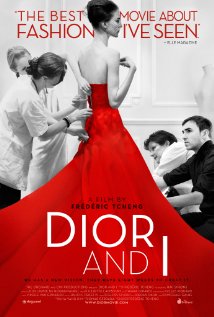
DIOR AND I
France, 2014, 90 minutes, Colour.
Raf Simons, Pieter Mulier, Sidney Toledano, Anna Wintour, Mariel Cottillard, Sharon Stone, Jennifer Lawrence, Harvey Weinstein and all the staff at Dior, behind the scenes.
Directed by Frederic Tcheng.
In recent years there have been documentaries and feature films about couturier, Yves St Laurent, highlighting his work and achievement in fashion as well as a great deal of detail about his personal life. Audiences should not expect this kind of treatment or revelations in Dior and I, even though it is based on book he wrote.
At the beginning, there is voice-over with a quotation from Christian Dior declaring that there were two of him. One was his real self (born 1905), the other being his public self (starting his work at the age of 41 in 1947). Apart from some tributes to him for his work and vision, some photographs from the 1940s and 1950s, and a visit to his family home, swimming in by helicopter, that is about all we discover about Dior himself.
So, this documentary is set in the present, introducing us to Belgian Raf Simons, the man chosen to be the contemporary designer for the company (2013) which is still flourishing, has its shop in Paris as well is its offices and its ateliers. Simons had been working in men’s fashion for 10 years with a reputation of being a minimalist, which he rather plays down. His new assistant is, another Belgian, Pieter Mulier.
Then we go behind the scenes and spend most of the film there, especially in the two ateliers with their extensive staff. in fact, we get something of the main designers, their sensibilities, their business sense, the pressure on them to achieve. And there are quite a number of interviews with some of the dressmakers, men and women, and a number of the seamstresses who have worked a long time for the company, one for 39 years. Most of the time, there are some genial human behind the scenes.
However, most of the attention is given to Simons himself, a middle-aged man, always wearing black, quietly authoritative, perceived at times as authoritarian, feeling the pressure of his work and his first show in the Dior tradition. We see him relating to the staff, approving designs, changing them, selecting materials, adapting the dresses as they are in progress, feeling the pressure of time, of the demands of clients in New York, choosing a mansion for the show, making a decision to cover the walls with flowers, with the logistics of how this can be done as well as keeping the flowers fresh.
We see Pieter Mulier and his liaising with the staff, supporting Simons. And then there is the show, the choosing of models, the fittings, the walk, plans for filming, the photographs, the interviews, focusing on greeting the guests (amongst whom Marion Cotillard, Sharon Stone, Jennifer Lawrence, Harvey Weinstein and, even, editor Anna Wintour), hugs and kisses, with Simons finally following the models onto the catwalk, cheerful, congratulated, a sense of achievement.
For those not up to date on fashion and/or ignorant of the amount of attention in detail it has to go into the design and the making, even down to stitching hems, There is something to learn about fashion. For those who are up-to-date and delight in colour, design, the range of dresses, plenty of satisfaction!
Published in Movie Reviews
Published in
Movie Reviews
Tagged under
Saturday, 18 September 2021 19:55
Welcome Home, Roscoe Jenkins
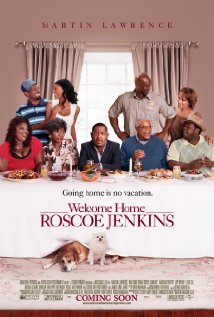
WELCOME HOME ROSCOE JENKINS
US, 2008, 114 minutes, Colour.
Martin Lawrence, James Earl Jones, Margaret Avery, Joy Bryant, Cedric the Entertainer, Nicole Ari Parker, Michael Clarke Duncan, Mike Epps, Mo 'Nique.
Directed by Malcolm D. Lee.
Easy enough to offer a general review of this comedy. If you don’t like Martin Lawrence, don’t go. If you do, go.
It is much the same as most of Martin Lawrence’s recent comedies. Lawrence’s screen persona is usually of a man who has some low self-esteem but who really has the capacity for great self-worth. This entangles him in all kinds of either phony behaviour or disguise on the job – like a policeman in Blue Streak or his double outing as Big Momma. After the escapades, he is the better man for it.
This time he is invited home for his parents Golden Wedding anniversary celebrations. His parents are played with some aplomb by James Earl Jones and Margaret Avery. But Roscoe is now a TV host with a show that is a blend of Oprah and Jerry Springer. The trouble is he has bad memories of his father favouring his bombastic, fatherless cousin, Clyde, who was taken into the family when both were boys – and rivalry usually led to Roscoe’s humiliation. This is especially true of his crush on a local girl, Lucinda. He has not visited home for many years but his son persuades him to go. He is engaged to a dominating beauty, Bianca (Joy Bryant), who has won Survivor on TV and who is psychologically geared to dominate everyone. There is also his big (very big) brother, Otis (Michael Clarke Duncan) and his large, outspoken and amorous sister, Betty (Mo’nique).
Mishaps galore when he returns home. His cousin (Cedric the Entertainer) reignites the rivalry and he is smitten by Lucinda (Nicole Ari Parker) all to the competitive dismay of Bianca. It is all predictable enough but the comedy is in watching how it all pans out and whether sentiment will win out at the end – as if we ever doubted it!
The comedy is geared towards an African American audience, poking fun at types and customs but celebrating community and family. Because of Martin Lawrence’s popularity, it reaches out to a wider audience.
1. A Martin Lawrence comedy? Malcolm Lee and his African-American? comedies, especially the Best Man films?
2. The title, home? Difficulties? Roscoe and his television career, his show, tabloid, changing his name, calling himself a doctor? His decision to go home after nine years, being changed by home?
3. Hollywood, glitz, television, his glamorous fiancee, the shows, the guests and interviews, the touch of the sensational, his name? The contrast with the home town, his family, the lifestyle, the past and the clashes, especially with Clyde?
4. The portrait of the family, Papa, hard, his putdowns of his son, patriarchal, yet love for his wife, tenderness? His care for Clyde and taking him in? The absence of his son? Mama, love for her husband, love for her children? Otis, the big man, his big wife, the children? Sister Betty, big and brash? The women, Lucinda? Reggie and his girlfriend, asking for money, blackmail for the television set?
5. Betty, marriages, big, going to the choir, looking for partners, loud, listening in, her contribution to the comedy and to family life?
6. Otis, his wife, their life, at home, the bond with his brother, the clashes, the kids?
7. Reggie, his girlfriend, white? Cadging money? The television, keeping Roscoe’s secrets?
8. Bianca, glamour, wealth, the decision to go, the cutting remarks? And making demands on Roscoe, her interactions with the family? Roscoe’s son, at home, contact with his grandfather, playing ball, the tensions with Bianca?
9. Roscoe, his return, his character, the reasons for his leaving, memories of the family, Clyde coming into the house, Roscoe getting the beatings, Clyde let off? His father favouring Clyde? The fight with Clyde, the games at the reunion, desperate to win? His memories of Lucinda, the dance, the coming to the family celebration, interactions, talking, people fighting them?
10. The dinner, the intention of filming?
11. Roscoe leaving, the pressure from Bianca? With his son, the return? The happy celebration?
12. His telling the truth to his father, and the support of his mother, a reconciliation, with Clyde, and a future with Lucinda?
Published in Movie Reviews
Published in
Movie Reviews
Tagged under